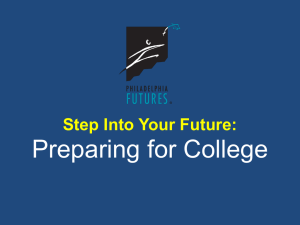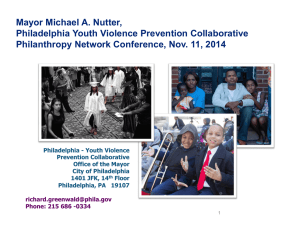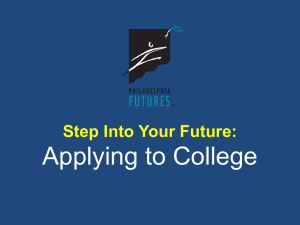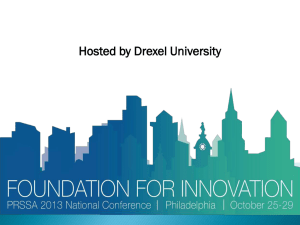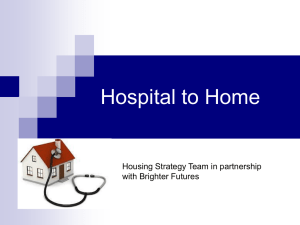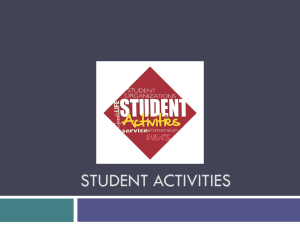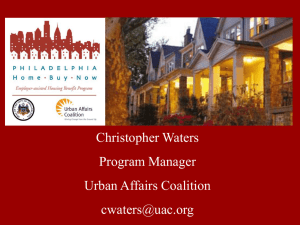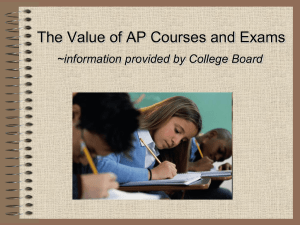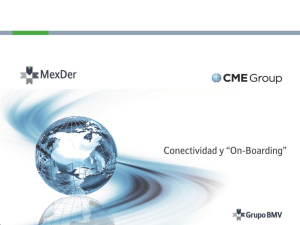powerpoint - Step Up to College
advertisement
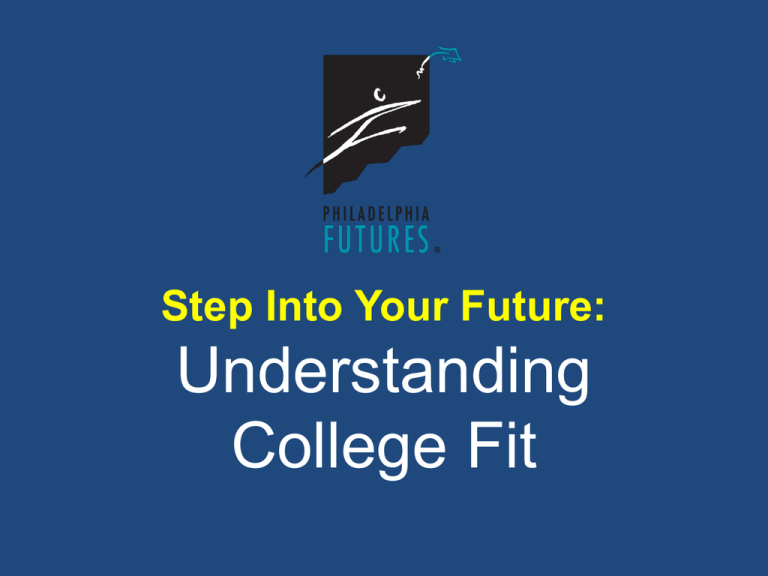
Step Into Your Future: Understanding College Fit Understanding College Fit STEP 1: Understanding “Fit” STEP 2: Become Familiar with Options for Continuing Your Education After High School STEP 3: Do “Fit” Research STEP 4: Know Where You Stand STEP 5: Put It All Together Philadelphia Futures STEP 1: Understanding “Fit” Philadelphia Futures Step 1: Understanding “Fit” Introduction Finding the college that is right for you means understanding the three primary components of “fit”: Academic – Consider whether a college meets your academic needs and you have the right academic foundation for that school. Social – Determine if you will be comfortable in your new environment in and out of the classroom. Financial – Be sure you can afford the cost of attending the school. Philadelphia Futures Step 1: Understanding “Fit” Questions to ask yourself to determine your college fit Academic Fit • Am I clear about what I want to study? Does this school have a program in that subject area? • Am I undecided about what I want to study and need a broad range of options? • What is my ideal learning environment (small and intimate or in large lecture halls)? • Am I prepared for the academic challenge at this college? • If I decide to change my major, are there other academic programs that interest me? Philadelphia Futures Step 1: Understanding “Fit” Questions to ask yourself to determine your college fit Social Fit • Do most students live on campus or commute to school? • What is the campus culture? • What activities are most popular on campus (athletics, Greek life, community service)? • What is the town/city like around the campus? • How do key campus demographics fit into my priorities? Philadelphia Futures Step 1: Understanding “Fit” Questions to ask yourself to determine your college fit Financial Fit • What are the criteria for merit-based scholarships? • What is the total cost of attendance? • What percentage of students receive need-based financial aid? • Can I afford to attend this college with manageable loan debt? Philadelphia Futures STEP 2: Become Familiar with Options for Continuing Your Education After High School Philadelphia Futures Step 2: Become Familiar with Options for Continuing Your Education After High School Four-Year Options Universities Universities are comprehensive institutions that award degrees at many levels — undergraduate bachelor’s degrees, graduate degrees and professional degrees (law or medicine). Many universities consider research to be one of their primary purposes. Universities provide a wide range of majors and academic programs. Liberal Arts Colleges Liberal Arts Colleges are private institutions that focus on exposing students to a variety of courses in literature, history, foreign language, math, science and the social sciences. Students are encouraged to explore academically before declaring a major. Specialized Schools Specialized Colleges offer academic programs or opportunities tailored to specific populations and can be private or public institutions. Philadelphia Futures Step 2: Become Familiar with Options for Continuing Your Education After High School Two-Year Options Community Colleges Community Colleges are public institutions which offer manageable tuition cost, flexible scheduling and skill development courses. There is rarely housing offered for community college students. Private Colleges Two-year private institutions offer associate’s degrees, certificate programs and preparation to transfer to four-year colleges. Some two-year private colleges offer housing. Philadelphia Futures STEP 3: Do “Fit” Research Philadelphia Futures Step 3: Do “Fit” Research What is “Fit” Research? “Fit” research is thorough, investigative research that uncovers the academic, social and financial characteristics of a college. Philadelphia Futures Step 3: Do “Fit” Research Levels of Research Basic Research Research which is completed by accessing general and easy-to-find information on a college’s website. “Fit” Research Research that is completed by thoroughly reviewing a college’s website from top to bottom and by consulting reliable secondary sources. The information found at the “fit” level is typically more specific, informative and meaningful than the information found at the surface level. Philadelphia Futures Step 3: Do “Fit” Research Academic Fit Basic Research • Mission of the school • Majors offered • Academic programs (e.g., study abroad, research opportunities, co-op programs) • School/program rankings “Fit” Research • Courses offered/profiles of key faculty • Class size • Academic support (e.g., writing center, tutoring) • Retention and graduation rates • Career services and job placements Philadelphia Futures Step 3: Do “Fit” Research Social Fit Basic Research • Location • Diversity of student body • Clubs, organizations, events and activities “Fit” Research • Gender breakdown • Socioeconomic breakdown • Geographic breakdown • Housing options • College culture • Presence of Greek life • Personal support services (multicultural center, counseling, healthcare, etc.) • Particular religious affiliation Philadelphia Futures Step 3: Do “Fit” Research Financial Fit Basic Research • Tuition and room/board costs • Institutional scholarships “Fit” Research • Additional costs and fees (transportation, books, lab fees, etc.) • Financial aid counseling • Percentage of students receiving need-based aid • Work-study options • Average loan debt upon graduation Philadelphia Futures Step 3: Do “Fit” Research Benefits and Impact of “Fit” Research The Power to Select Completing “fit” research will provide you with the information you need to make an appropriate college selection. The Power to Impress Completing “fit” research will provide you with a depth of knowledge about a school to impress admissions officers in essays and interviews. Philadelphia Futures STEP 4: Know Where You Stand Philadelphia Futures Step 4: Know Where You Stand A critical part of fit research is understanding the college’s Admissions Profile. The Admissions Profile will highlight the following: • Number of applicants • Number of admitted students • Average GPA and SAT score of accepted students • Diversity breakdown of the incoming freshman class (gender, geography, first-generation-to-college students) • Average financial aid package Futures Tip for Success: Review the Admissions Profile for each school on your list and see how your profile compares. Philadelphia Futures STEP 5: Put It All Together Philadelphia Futures Step 5: Putting It All Together Once you have identified the schools that are the “right fit” for you, make a realistic list of schools to apply to: 1-2 Reach Schools – Schools at which you will be comfortable, but which may have an admissions profile that is stronger than yours. 2-3 Strong Matches – Schools that are almost perfect matches for your profile – your academic credentials fall well within the school’s average. 1-2 Likely Admits – Schools at which your profile clearly meets or exceeds the school’s criteria for admission. Futures Tips for Success: A balanced list of “right fit” schools will increase your chances for admission, opportunities for financial aid and success in college. Futures Tips for Success: It is recommended that all Philadelphia students apply to Community College of Philadelphia (CCP) and take the placement exam. This will provide an option for college and, if you choose to attend another school, will allow you to take classes at CCP during the summer. Philadelphia Futures
